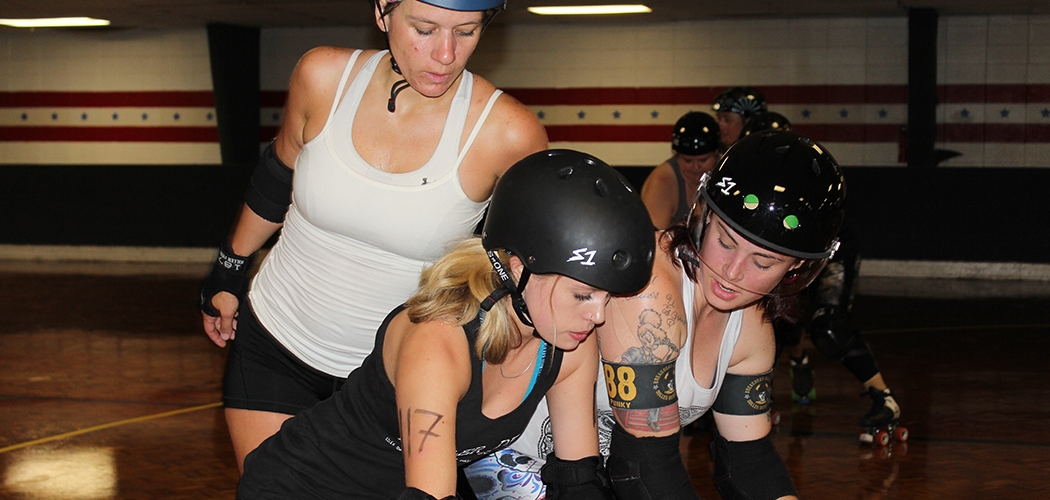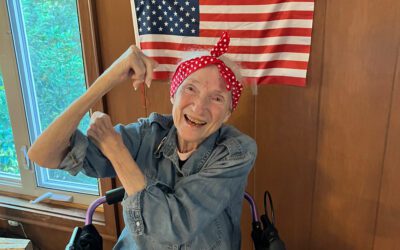[title subtitle="words and images: Dwain Hebda"][/title]
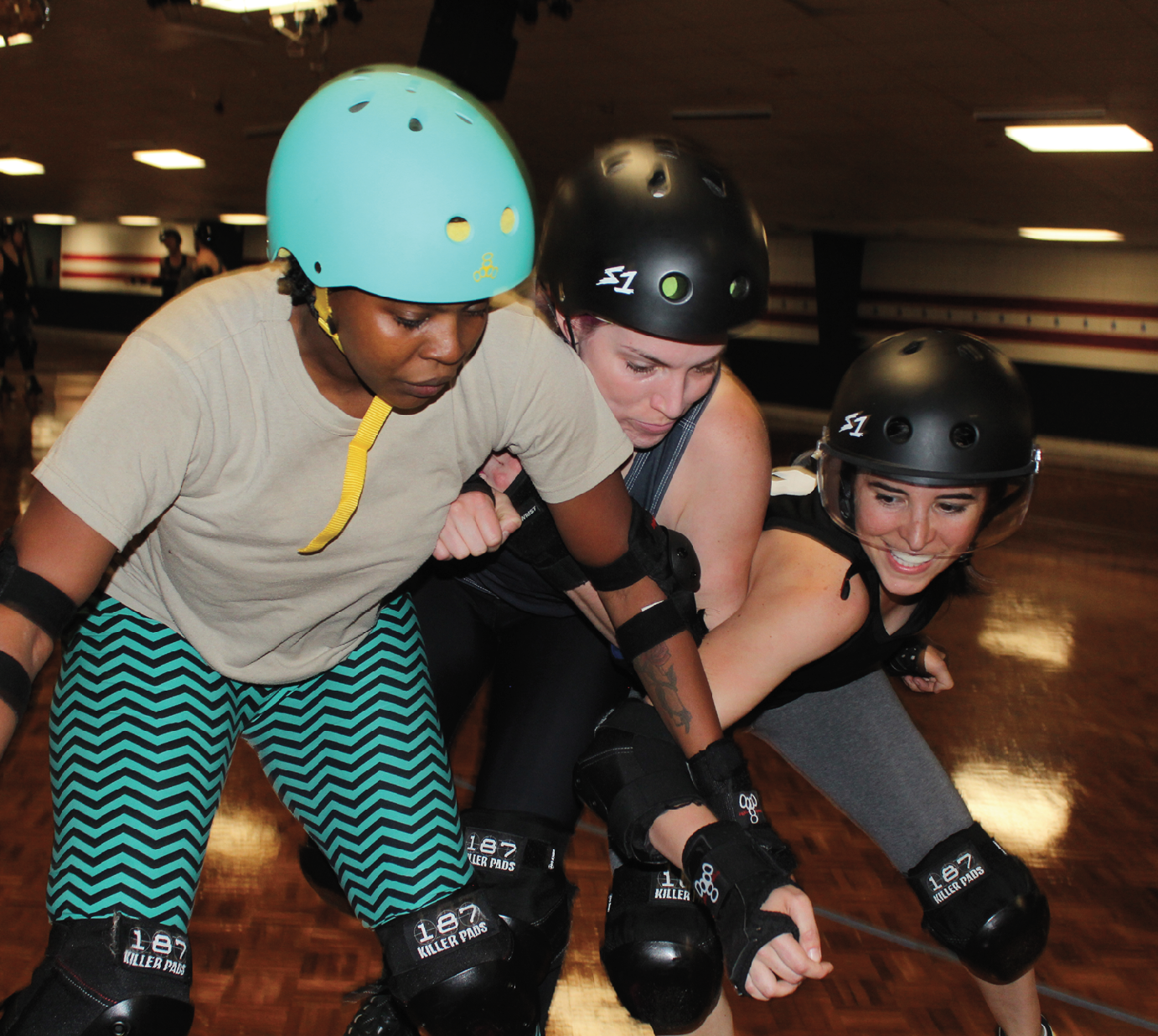
About twenty skaters are here at Arkansas Skatium in west Little Rock for the regular Wednesday night practice of CARD, the Central Arkansas Roller Derby team. It’s an environment that defies the sport’s rough-hewn reputation; collisions evoke smiles, wipeouts produce cheers and encouragement.
Amid the assorted body types, skating abilities and experience levels, what all these athletes have in common is a palpable self-confidence, personified as Levitica Byington thunders by. At thirty-six, there are two things that have dominated her time on this earth — the United States Air Force and roller derby — as she’s been doing both for about half her life. Most of the time the pursuits reside peacefully, side by side. Both require controlled aggression; both have earned her a family of unfailing comrades and given her outlets for her natural leadership skills.
But when push came to rolling shove a few years ago, and roller derby and military service stood eye-to-eye, incredibly it was Uncle Sam who blinked. “The military didn’t want me to get hurt. Otherwise, they couldn’t deploy me,” she says as a broad smile inches across her face. “I had to sign a form in order to do this.”
The Air Force had little to worry about. Levitica – aka Leviticus Maximus when she’s skating – is a bend-but-don’t-break kind of athlete who despite being one of the most experienced skaters on the floor, won’t even get off the bench without a helmet when her skates are on.
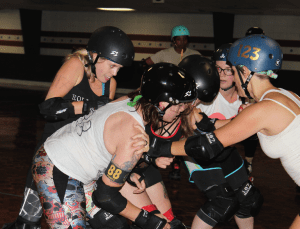 Yes, she’s been nipped by the injury bug of late with a recent ankle sprain, but invariably it’s the other skater who gets the worst of the hip checks, jostling and collisions that are a legal part of the game. In her skating career, she’s laid out competitors in multiple states and while stationed in Japan. “We would play the men and try to teach them what to do,” she says of the Japanese league. “Women there are very different than us, so for a man to (collide with) me, it was really hard. Then when I knocked them down they were like, ‘Did that just happen?’”
Yes, she’s been nipped by the injury bug of late with a recent ankle sprain, but invariably it’s the other skater who gets the worst of the hip checks, jostling and collisions that are a legal part of the game. In her skating career, she’s laid out competitors in multiple states and while stationed in Japan. “We would play the men and try to teach them what to do,” she says of the Japanese league. “Women there are very different than us, so for a man to (collide with) me, it was really hard. Then when I knocked them down they were like, ‘Did that just happen?’”
As she says this, another skater zips by, slowing just enough so that you can read the sticker plastered to the side of her blue helmet. It reads, “FEMALES ARE STRONG AS HELL.”
Roller derby is a purely American invention, born in the 1920s as a team speed skating competition. In the 1930s physical contact got written into the rules, a key element of the sport’s runaway popularity for the next forty years. The sport all but disappeared in the 1970s only to resurface stronger than ever in the 2000s. Men’s clubs do exist, but the vast majority of teams in the U.S. today are women’s, boosted by the reality show Roller Girls that drove waves of skaters to their local roller rinks.
“I was introduced to roller derby through Roller Girls,” says Daisy Fever, a dog groomer by day who cheerfully refused to share her real name for publication. “It was the girls that were, may I say, super badass. They just looked really fierce and awesome and strong and hardcore, and they were on skates, and they were hitting each other, and they loved it. That was my initial, like, ‘I have to do this right now,’ moment.”
The object of the game, in its simplest terms, is a single skater known as a jammer earning points by passing the opposing team’s skaters on the track. Skating in a pack, the other skaters, called pivots and blockers, try to impede the opposing jammer from getting through while also creating lanes for their own jammer.
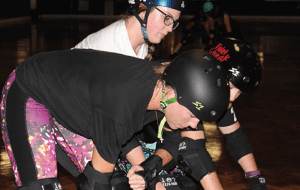 Beyond those basic rules, and the use of quad roller skates, today’s game has little in common with past iterations. The high-banked tracks many people think of are largely a thing of the past, as flat tracks allow more facilities (rinks, gymnasiums, community centers) to offer roller derby without the expense of a special set-up.
Beyond those basic rules, and the use of quad roller skates, today’s game has little in common with past iterations. The high-banked tracks many people think of are largely a thing of the past, as flat tracks allow more facilities (rinks, gymnasiums, community centers) to offer roller derby without the expense of a special set-up.
Previous versions were also prone to myriad gimmicks to gain fans, from thuggery bordering on pro wrestling cartoonishness to upping the sex appeal. “They really cleaned it up. This sport has changed so much since I joined,” Levitica says. “In the beginning, it was tulle skirts and the makeup and the glitter. Then they went, ‘Wait a minute. We’re athletes. You can’t wear that crap.’”
Perhaps the biggest change in the sport today is the diversity that’s represented. Women come from all walks of life to skate and while there are plenty of tattoos and piercings to go around, it’s not a bunch of lumbering biker chicks looking to brawl. Finesse, strategy and pure athleticism win games; the nose rings and tattoo sleeves are just these women being themselves.
“When I was a figure skater I never fit the mold because I was so much taller and broader,” says Kasey Miller, aka KC/DC. “I should have been playing hockey instead of ice skating but it was the ‘80s and girls didn’t do that sort of thing, especially a five-year-old girl.”
Kasey found roller derby as a way to be more active after moving to Central Arkansas from Virginia with her work. On the track, the statuesque brunette looks like an intimidating growler; up close she’s a chirpy Catholic campus minister who happens to have a taste for contact. “There’s a place for everyone,” she says. “We have people here who have never done an athletic thing in their life and they have turned into amazing athletes. Or people who have struggled with issues with their body, eating disorders or confidence who got up and sang the national anthem in front of everybody.”
Kasey hasn’t passed all her preliminary tests that qualify her to join a team yet; in fact, there are certain drills in practice she’s not allowed to do until she learns the finer points of hitting and being hit. But even though she has yet to make a roster, the activity has paid enormous dividends. “It kind of allows me to stretch certain muscles that maybe don’t get stretched in the office. Having a ministerial role, I’m being more of a servant, supporting and pushing others,” she says. “Here, I have other people pushing me out front, empowering me. So a lot of things I’ve learned in derby have helped me empower and encourage my students and vice versa. It helps me be more fully myself.”
The day’s guest coach – a skater from Georgia – barks out the next drill, involving skating laps while negotiating around and over low cones to improve maneuverability and balance. The experienced skaters zip through the course and skid to a hard, screeching stop. KC/DC’s pace is more deliberate but is set to the music of half a dozen teammates cheering her on.
Daisy, the single mother of two boys, says even in a contact sport there’s far more that binds than divides. “The fact that we’re all women doesn’t mean we catfight because we don’t. We really don’t,” she says. “We’re all here for the same thing, we all want the same thing out of it and I think that we always keep that as our biggest focus. If there’s an argument or drama, we put a stop to it. I think ultimately we see the broader picture.”
We have people here who have never done an athletic thing in their life and they have turned into amazing athletes. Or people who have struggled with issues with their body, eating disorders or confidence who got up and sang the national anthem in front of everybody.
At rink-side two elementary schoolgirls complete a coloring sheet while mom hammers her way through practice. The youngsters glance up only sporadically; unlike many adults, their mother’s chosen recreation doesn’t faze them in the least. Girls can do anything after all, so what’s the big deal. In a sport built around strength and attitude, it’s this attitude of strength the women of CARD ultimately seek in themselves and invest in one another.
Central Arkansas Roller Derby practices on Monday and Wednesday.
Arkansas Skatium
1311 South Bowman Road, Little Rock
Games take place at the Conway Expo Center and Fairgrounds. For more information, visit cearderby.com.
Closer to home, check out River Valley Roller Girls on Facebook.

